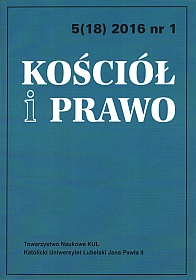The Pauline Privilege According to the 1983 Code of Canon Law
Abstract
In this study the author is concentrates on the institution of the Pauline Privilege that functions in the canon law. Assessing the functioning of this institution in the historic context, she focused her research on detailed analyses of the canons 1143-1147 of the 1983 Code of Canon Law.
From the conducted analyses it appears, that usage of the Pauline Privilege is possible after fulfillment of the following requirements: 1) natural marriage was concluded effectively before the baptism of both of the spouses; 2) baptism of one of the spouses was conducted in the situation when the other spouse remains non-baptized; 3) the leaving of the non-baptized party was performed in a factual and unambiguous manner; 4) proceeding to another marriage by a baptized party is the cause of the dissolution of the previous wedlock; 5) based on the Pauline Privilege, the baptized party should marry a Catholic; 6) the diocesan of the area in the specific cases and as a result of a serious cause, has the right to give permission for a marriage of a converted party with a non-baptized party; 7) the non-baptized party has the right to enter wedlock with a Catholic party, when the infidel had lived with the latter in peace, with no offence to the Creator, to then walk away.
References
Bersini, Francesco. 1983. Nuovo diritto canonico matrimoniale. Commento Giuridico-teologico-pastorale. Torino: Leumann: Elle Di Ci.
D’Auria, Angelo. 2007. Il matrimonio nel diritto della Chiesa. Città del Vaticano: Lateran University Press.
Dzierżon, Ginter. 1999. „Sakramentalność małżeństwa ochrzczonych.” Ius Matrimoniale 10:107-124.
Dzierżon, Ginter. 2002. Niezdolność do zawarcia małżeństwa jako kategoria kanoniczna. Warszawa: Wydawnictwo UKSW.
Dzierżon, Ginter. 2005. „Privilegium fidei w kanonicznym prawie małżeńskim.” Ius Matrimoniale 10:85-118.
Dzierżon, Ginter. 2013. „Współczesne kontrowersje doktrynalne wokół tzw. „przywileju piotrowego”.” W Rozwiązanie małżeństwa w prawie kanonicznym, red. Wiesław Kiwior, Urszula Nowicka, i Henryk Stawniak, 95-113. Warszawa: Prymasowskie Wydawnictwo Gaudentinum.
Góralski, Wojciech. 1987. Kościelne prawo małżeńskie. Płock: Płockie Wydawnictwo Diecezjalne.
Góralski, Wojciech. 2011. Małżeństwo kanoniczne. Warszawa: LexisNexis.
Hervada, Javier. 1992. Lecciones propedeuticas de Filosofia del Derecho. Pamplona: EUNSA.
Moneta, Paolo. 1996. Il matrimonio nel nuovo Diritto Canonico. Genova: ECIG.
Navarrete, Urbano. 1980. “De notione et effectibus consumationis matrimonii.” In Quaedam problemata actualia de matrimonio, edited by Urbano Navarrete, 105-150. Romae: Pontificia Università Gregoriana.
Nowakowski, Bartosz. 2013. Rozwiązanie małżeństwa in favorem fidei. Poznań: Prymasowskie Wydawnictwo Gaudentimum.
Nowicka, Urszula. 2013. „Rozwiązanie małżeństwa na mocy przywileju pawłowego.” Rozwiązanie małżeństwa w prawie kanonicznym, red. Wiesław Kiwior, Urszula Nowicka, i Henryk Stawniak, 77-94. Warszawa: Prymasowskie Wydawnictwo Gaudentinum.
Pawluk, Tadeusz. 1984. Prawo kanoniczne według Kodeksu Jana Pawła II. T. 3: Prawo małżeńskie. Olsztyn: Warmińskie Wydawnictwo Diecezjalne.
Sobczak, Aleksander. 2010. Stwierdzenie nieważności małżeństwa. Poznań: Wydawnictwo Zysk i S-ka.
Świaczny, Seweryn. 2012. „Rozwiązanie węzła w małżeństwie nieochrzczonych. Próba systematyzacji.” Ius Matrimoniale 13:119-147.
Żurowski, Marian. 1987. Kanoniczne prawo małżeńskie Kościoła katolickiego. Katowice: Księgarnia św. Jacka.
Copyright (c) 2016 Kościół i Prawo

This work is licensed under a Creative Commons Attribution-NonCommercial-NoDerivatives 4.0 International License.





